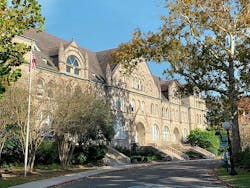Tulane University inks 30-year Energy Ops deal with Bernhard focused on Renewables, Efficiency & CHP
Louisiana-based engineering and contracting firm Bernhard will provide solar power, O&M and energy efficiency services over a 30-year period for Tulane University in New Orleans.
The long-term Energy-as-a-Service agreement includes large-scale improvements to campus infrastructure and construction of a 1-MW solar facility that will produce 10 percent of Tulane’s total electricity needs at its uptown campus. The university is aiming for carbon neutrality in its operations by 2050.
Bernhard is guaranteeing “significant” annual utility cost savings over the 30-year EaaS deal, according to the release.
“This partnership is a major step forward in Tulane’s continued commitment to environmental sustainability. Through it we will significantly reduce our greenhouse gas emissions as we journey toward a carbon neutral future that also fully supports our critical research and educational missions,” Tulane President Michael Fitts said. “By increasing efficiency, building resilience and seeking alternative energy sources, the Bernhard and Tulane partnership is expected to also achieve the goal of a 30% reduction in greenhouse gases by 2025 as outlined in Tulane’s Climate Action Plan.”
Subscribe to our free, tri-weekly newsletter for more stories like this
Tulane, of course, is located in one of the nation’s most volatile and vulnerable hurricane zones, so energy resiliency is a key priority. Bernhard’s work will include design, upgrade, operations and maintenance of on-campus combined heat and power (CHP), standby and backup generator-sets, lighting and energy integration.
"We see this partnership with Tulane as not only beneficial for their campus, but the entire state of Louisiana," said Ed Tinsley, Bernhard CEO. "Tulane and Bernhard's efforts in creating a more sustainable and resilient future with optimized energy usage and reduced carbon profile will have a positive ripple effect throughout the region."
Tulane’s CHP plant has a power generation capacity of 5 MW, with two gas-fired boilers and one-heat recovery boiler used to generate steam for campus buildings and research centers. The complex also houses five chillers with a combined capacity of 11,000 tons.
Project RISE (Renew, Innovate, Sustain, Engage) is a collaborative effort with Tulane and Bernhard to deal with capital renewal, sustainability and energy optimization across the uptown campus. The goal is bringing one of more Tulsa buildings to net zero emissions status by 2025.
----
(Rod Walton, senior editor for EnergyTech, is a 14-year veteran of covering the energy industry both as a newspaper and trade journalist. He can reached at [email protected]).
About the Author
Rod Walton, EnergyTech Managing Editor
Managing Editor
For EnergyTech editorial inquiries, please contact Managing Editor Rod Walton at [email protected].
Rod Walton has spent 17 years covering the energy industry as a newspaper and trade journalist. He formerly was energy writer and business editor at the Tulsa World. Later, he spent six years covering the electricity power sector for Pennwell and Clarion Events. He joined Endeavor and EnergyTech in November 2021.
Walton earned his Bachelors degree in journalism from the University of Oklahoma. His career stops include the Moore American, Bartlesville Examiner-Enterprise, Wagoner Tribune and Tulsa World.
EnergyTech is focused on the mission critical and large-scale energy users and their sustainability and resiliency goals. These include the commercial and industrial sectors, as well as the military, universities, data centers and microgrids. The C&I sectors together account for close to 30 percent of greenhouse gas emissions in the U.S.
He was named Managing Editor for Microgrid Knowledge and EnergyTech starting July 1, 2023
Many large-scale energy users such as Fortune 500 companies, and mission-critical users such as military bases, universities, healthcare facilities, public safety and data centers, shifting their energy priorities to reach net-zero carbon goals within the coming decades. These include plans for renewable energy power purchase agreements, but also on-site resiliency projects such as microgrids, combined heat and power, rooftop solar, energy storage, digitalization and building efficiency upgrades.

